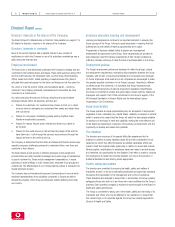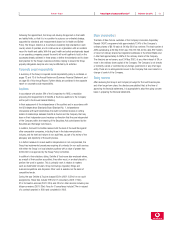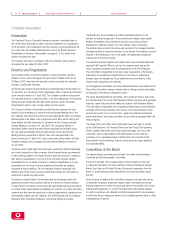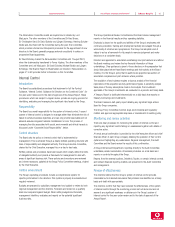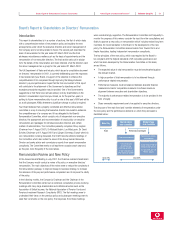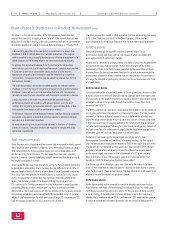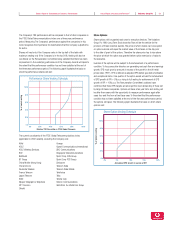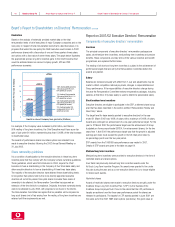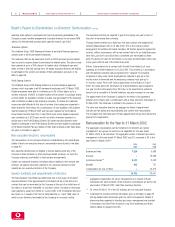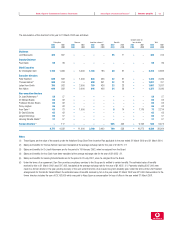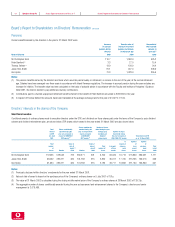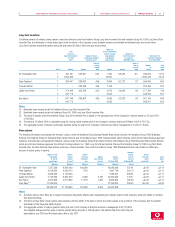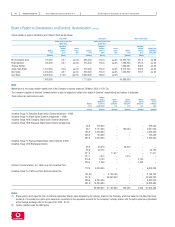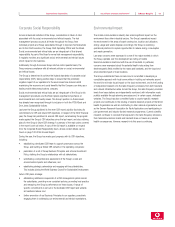Vodafone 2002 Annual Report Download - page 62
Download and view the complete annual report
Please find page 62 of the 2002 Vodafone annual report below. You can navigate through the pages in the report by either clicking on the pages listed below, or by using the keyword search tool below to find specific information within the annual report.
Vodafone Group Plc Annual Report & Accounts and Form 20-F Board’s Report to Shareholders on Directors’ Remuneration60
Board’s Report to Shareholders on Directors’ Remuneration continued
Illustration
Based on the analysis of externally provided market data on the total
remuneration levels of chief executives of major European companies and on the
new policy in respect of total remuneration levels that is described above, it is
proposed that under the new policy the Chief Executive would receive in 2002
performance shares with a face value of one and three quarters-times salary
and options with a face value of seven-times salary. The graph below illustrates
the approximate pre-tax long term incentive gains to the Chief Executive that
would be achieved based on various Company growth, EPS and TSR
performance scenarios:
For example, if the Company value increases by £50 billion, and there is
50% vesting of long term incentives, the Chief Executive would have a pre-tax
gain of just under £4 million, representing less than 0.008% of the total increase
in shareholder value.
The awards of performance shares and share options are intended to be
made to executive directors following the 2002 Annual General Meeting on
31 July 2002.
Share ownership guidelines
It is a condition of participation by the executive directors in these long term
incentive plans that they comply with the Company’s share ownership guidelines.
These guidelines, which were first introduced in 2000, require the Chief
Executive to have a shareholding in the Company of four times base salary and
other executive directors to have a shareholding of three times base salary.
The majority of the executive directors have attained these shareholding levels.
In recognition that options held by the more recently appointed executive
directors will not at the present time yield shares to enable these levels of
ownership to be attained, the Remuneration Committee has approved an
extension of the time limits for compliance. Originally, the share ownership levels
were to be attained by July 2003, with progress to be shown in the interim.
The Remuneration Committee has agreed that no penalties will be imposed so
long as all shares (net of tax) arising from the vesting of long term incentives are
retained until the requirements are met.
Report on 2001/02 Executive Directors’ Remuneration
Components of executive directors’ remuneration
Overview
The principal components of executive directors’ remuneration packages are
salary, short/medium term incentives, medium/long term incentives and pension
benefits. These components, and key terms of the various incentive and benefit
programmes, are explained further below.
The vesting of all short and long term incentives is subject to the achievement of
performance targets that are set by the Remuneration Committee before the
awards are granted.
Salary
Salaries are reviewed annually with effect from 1 July and adjustments may be
made to reflect competitive national pay levels, changes in responsibilities and
Group performance. If the responsibilities of executive directors change during
the year the Remuneration Committee reviews remuneration packages, including
salaries, at that time. Only base salary is used to determine pensionable salary.
Short/medium term incentives
Executive directors are eligible to participate in the STIP, a deferred share bonus
plan that has been described in the section entitled “Remuneration Review and
New Policy”above.
The target level for base awards granted to executive directors for the year
ended 31 March 2002 was 100% of salary with a maximum of 200% of salary.
Awards are contingent on achievement of a one-year performance target. For the
year to 31 March 2002 the performance target was the achievement of Group
budgeted pro forma proportionate EBITDA. For enhancement shares, for the two
years from 1 April 2001 the performance target was that the growth in adjusted
earnings per share must exceed the growth in the UK retail price index by
six percentage points over the two-year period.
STIP awards from the 1998/99 base performance year vested in 2001.
Details of STIP awards are given in the table on page 64.
Medium/long term incentives
Medium/long term incentives were provided to executive directors in the form of
restricted shares and share options.
Arun Sarin has previously received long term incentive awards under the
AirTouch Long Term Incentive Program. No awards were granted to him under
this plan during the year and as a non-executive director he is no longer eligible
to receive such awards.
Restricted shares
Awards of restricted shares were made to executive directors annually under the
Vodafone Group Long Term Incentive Plan (“LTIP”) by the Trustees of the
Vodafone Group Employee Trust. If and to the extent that the LTIP performance
targets are achieved over the three-year performance period the shares are
released to participants. The targets for LTIP awards granted in June 2001 are
the same as for the 2001 GMR share options (see below). The grant value at
10.48
+£25 bn
+£50 bn
+£75bn
100% Vesting (80th percentile
TSR ranking & UK RPI+15%
EPS growth per annum)
75% Vesting (73rd percentile
TSR ranking & UK RPI+11.7%
EPS growth per annum)
50% Vesting (64th percentile
TSR ranking & UK RPI+8.3%
EPS growth per annum)
25% Vesting (median TSR
ranking & UK RPI+5% EPS
growth per annum)
12
10
8
6
4
2
0
Chief Executive Pre-Tax Gain (£’millions)
Growth in value of Company from grant date (£’billions)




